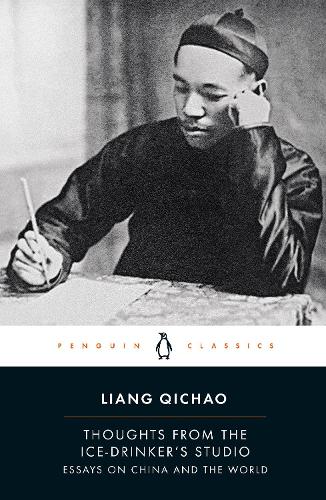
Thoughts From the Ice-Drinker's Studio: Essays on China and the World
(Paperback)
Publishing Details
Thoughts From the Ice-Drinker's Studio: Essays on China and the World
By (Author) Liang Qichao
Translated by Peter Zarrow
Introduction by Peter Zarrow
Notes by Peter Zarrow
Penguin Books Ltd
Penguin Classics
6th February 2024
26th October 2023
United Kingdom
Classifications
Tertiary Education
Non Fiction
Asian history
Political structures / systems: democracy
Nationalism and nationalist ideologies and movements
Geopolitics
Literary studies: c 1900 to c 2000
895.145
Physical Properties
Paperback
272
Width 129mm, Height 198mm, Spine 15mm
202g
Description
Daring essays on democracy, history and the nation state by one of China's leading twentieth-century intellectuals The power, anger and fluency of Liang Qichao's writings make him one of the towering figures in modern Chinese literature. He saw his great, almost unmanageable task as an attempt to write China into the new era - to provide an ancient country, devastated by civil war and foreign predators with the intellectual equipment to renew itself. China could only recover through a clear-sighted, informed understanding of its enemies - and by engaging in a thorough-going self-critique. Then China would be able to expel its invaders, reform its society and become a great power once more. Liang said that he wrote from an 'ice-drinker's studio', implying that underneath his dispassionate tone lay an ardour and passion which only ice could cool. This selection of pieces shows Liang's extraordinary range and the burning sense of mission which drove him on. Blending together Confucianism, Buddhism and the Western Enlightenment, Liang's ideas about nation, democracy and morality had a profound impact on Chinese visions of the political order, though the China that eventually emerged from the further disasters of the 1930s and 1940s would be a very different one.
Reviews
China's first iconic modern intellectual. His lucid and prolific writings, touching on all major concerns in his own time and anticipating many in the future, inspired several generations of thinkers including the much younger Mao Zedong. -- Pankaj Mishra
Author Bio
Liang Qichao (1873-1929) was a reformist intellectual, who facing brutal repression fled to Japan where he lived for fourteen years. His long exile, travels and writing - of fiction, journalism and above all essays - gave Liang a unique authority in the first years of the twentieth century. Peter Zarrow is Professor of History at the University of Connecticut and Adjunct Research Fellow at the Institute of Modern History, Academia Sinica. He has held teaching and research positions in Australia and Taiwan, and he has published extensively in English and Chinese on the intellectual and cultural history of China in the nineteenth and twentieth centuries.
